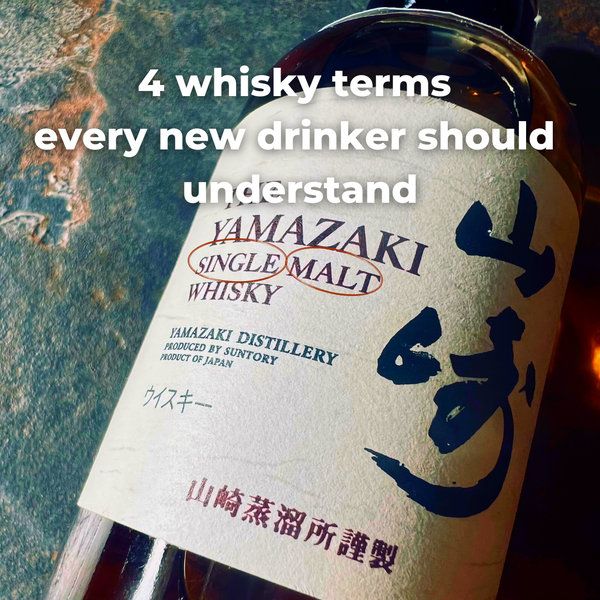When I first started getting into whiskies, there were many concepts casually thrown about that I couldn’t understand. Perhaps bartenders and aficionados can seem a little impatient and intimidating to newcomers that I mostly just pretended to understand what the bartender was saying. That’s not ideal! In this series, I've compiled a list of every important whisky term that beginners should know- served in bite-sized morsels so you don’t fall asleep in my lecture.

If you’ve just getting started with whiskies, here are 4 terms you ought to know:

1. Whisky (and Whiskey)
Let’s start with pure basics. For a good part of my young adulthood, I visited fancy cocktail bars and confidently ordered and drank rum, brandy and whisky with no actual idea how they are different.

What exactly is whisky? Whisky is a distilled alcoholic spirit traditionally made from malted barley, then aged in a barrel for at least 3 years. Think of it as the older sibling of beers (for a better explanation, check out our in-depth write-up on how whisky is made).

Are there exceptions? Yes! Around the world, people have made whisky from other types of grains, apart from malted barley. Irish people use both malted barley and unmalted barley. Americans use mainly corn, rye and wheat to make their thing. Some avant garde distillers have begun making “whisky” by using oats or even rice - although this is still a little controversial.

What about brandy or rum? How are they different from whisky? They are completely different beasts. Remember that whisky is made from grains? Great! Rum is made from sugar cane, while brandy is made from grapes or other fruits.

So is it “whisky”, or “whiskey”? Which is the right spelling? They are both correct!
“Whisky” is the original spelling used by most of the world including Scotland, England, Japan, Taiwan, Canada, Australia and New Zealand.
“Whiskey” is a spelling popularised by the Irish – and used both in Ireland and USA. Back in the early 19th century, Irish distilleries enjoyed great popularity and could be sold at a premium over Scottish whisky. To distinguish their stuff from Scotch, Irish distilleries decided to collectively refer to their spirit as “whiskey”.

2. Single Malt

The term “Single Malt means two things: firstly, that the whisky is from a single distillery, and secondly, that the whisky is made from 100% malt (i.e. barley that has germinated and sprouted).
All single malts come from Scotland, right? Nope! Although Scottish distilleries popularised their Single Malt whiskies, whisk(e)y makers from other regions have begun to adopt similar whisky-making processes as the Scots, and labelled their products as such.
Here’s a well-known example of a Japanese Single Malt:-

Here’s a well-known example of an Irish Single Malt:-

3. Single Grain

“Single Malt” whisky may be contrasted with “Single Grain” whisky. “Single Grain” also denotes that the stuff is from one single distillery. However, the word “grain” implies that not 100% of the stuff is made with malted barley. A portion, (likely a large portion) of the whisky would have been made with other types of grains, including corn or wheat.
4. Blended Whisky / Blended Malt / Blended Grain
Most people’s first experience with a whisky in their late teen years would likely be with a “blended” whisky. Perhaps the most familiar brand of blended whisky is the Johnnie Walker:-

As a “blended whisky”, the Johnnie Walker Red Label is a mixture of both grain and malt whiskies, and from different distilleries.
But wait, there are different variants of blended whiskies.
For example, there are “blended malt” whiskies:-

As a “blended malt” whisky, the Compass Box Spiced Tree expression is a mixture of malt whiskies from different distilleries.
There are also “blended grain” whiskies:-

As a “blended malt” whisky, the Compass Box Hedonism expression is a mixture of grain whiskies from different distilleries.
“Blended” whiskies are much more common than single malts. Many brands of blended whiskies are regularly found in grocery stores with the likes of Johnnie Walker, Monkey Shoulder, Chivas and Ballantine’s.
Are “blended” whiskies inferior to single malts? That’s a wrong assumption! Single malt whiskies tend to command higher price points due to their relative scarcity compared to blended whiskies. But that is no indication of the quality of blended whiskies.
It is true that a lower quality whisky would more likely have been a “blended” whisky. This is because it is easier for blenders of lower repute to cut corners to sell a cheaper product. However, there are blenders of high repute who are take whisky blending very seriously, and whose products could rival very good single malt expressions.
One of my favourite expressions of blended whisky is produced by John Glaser’s Compass Box, a well-regarded brand of blended Scotch across the whisky world.
If you enjoyed what you were reading, you’ll probably like these too
- What is whisky? How does it differ from beer, brandy or rum?
- The Cowboys’ Whiskey: Basics of American Whiskey and Bourbon
- Millennials are beginning to love Irish whiskey more than Scotch. Why?
- The Rockstar, Anti-Establishment Whisky Makers: Compass Box
Kanpai!

@charsiucharlie







